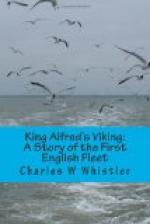Very glad were the good steeds to see us come, and the falcon, who still sat on the saddle where I had perched her, spread her wings and ruffled her feathers to hear us. I unhooded and fed her; and we washed in the stream, and set out gaily enough, making southward, for so we thought we should strike the great road. And at last, when we saw its white line far off from a steep hillside, I was glad enough.
I cannot tell how we had reached our halting place through the hills in the dark, nor could I find it again directly. It was midday before we reached the road, riding easily; so that, what with the swift gallop of the hunting and the long hours of riding in mist and darkness, we had covered many miles. We saw no house till we were close to the road, and then lit on one made of stones and turf hard by it, where an old woman told us that no party had been by since daylight.
So we turned eastward and rode to meet the king, and did so before long. He had left men at his village to wait for us in case we came back there; but he laughed at us for losing ourselves, though he said he had no fear for sailors adrift in the wilds when Ethelnoth came in without us.
But when, as we rode on, I told him what had befallen us, he listened gravely, and at last said:
“I have heard the like of this before. Men say that the pixies dwell in the moorland, and will dance to death those who disturb them. What think you of those you have seen?”
I said that, having slain them, one could not doubt that they were men, if strange ones.
“That is what I think,” he answered. “They are men who would be thought pixies. Maybe they are the pixies. I believe they are the last of the old Welsh folk who have dwelt in these wilds since the coming of the Romans or before. There were the like in the great fens of East Anglia and Mercia when Guthlac the Holy went there, and he thought them devils. None can reach these men or know where they dwell. Maybe they are heathen, and their dance in that stone ring was some unholy rite that you have seen. But you have been very far into the wastes, and I have never seen those stones.”
And when he handled the gold rings, he showed me that they were very old; but when he handled the drumhead and looked at the marks thereon, he laughed.
“Here is the magic of an honest franklin’s cattle brand. I have seen it on beasts about the hills before now. The pixies have made a raid on the farmer’s herds at some time.”
Now I think that King Alfred was right, and that we had fallen into the hands of wild Welsh or Cornish moor folk. But one should hear Kolgrim’s tale of the matter as he shows his sword sheath that he made of the drumhead; for nothing would persuade him that it was not of more than mortal work.
“Had the good king been in that place with us, he would have told a different tale altogether,” he says.
So we went on our journey quietly, and ever as we went and spoke with Alfred, I began to be sure that this pale and troubled king was the most wondrous man that I had ever seen. And now, as I look back and remember, I know that in many ways he was showing me that the faith he held shaped his life to that which seemed best in him to my eyes.




